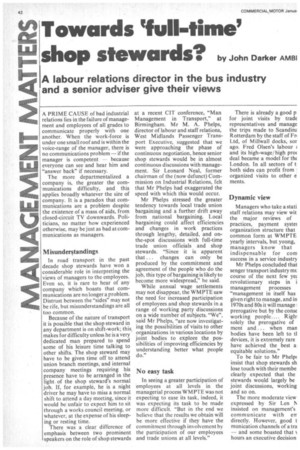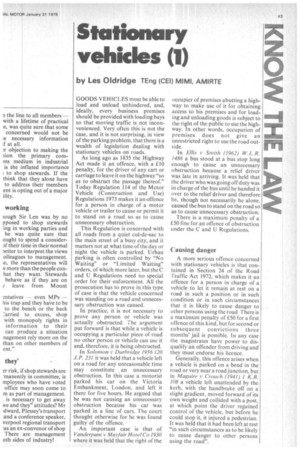Towards
Page 46

Page 47

If you've noticed an error in this article please click here to report it so we can fix it.
IN shop stewards?
A labour relations director in the bus industry and a senior adviser give their views
by John Darker AMBI A PRIME CAUSE of bad industrial relations lies in the failure of management and employees of all grades to communicate properly with one another. When the work-force is under one small roof and is within the voice-range of the manager, there is no communications problem — if the manager is competent — because everyone can see and hear him and "answer back" if necessary.
The more departmentalized a company is, the greater the communications difficulty, and this applies broadly whatever the size of company. It is a paradox that communications are a problem despite the existence of a mass of aids, from closed-circuit TV downwards. Politicians, no matter how experienced otherwise, may be just as bad at communications as managers.
Misunderstandings
In road transport in the past decade shop stewards have won a considerable role in interpreting the views of managers to the employees. Even so, it is rare to hear of any company which boasts that communications are no longer a problem. Distrust between the "sides" may not be rife, but misunderstandings are all too common.
Because of the nature of transport it is possible that the shop steward in any department is on shift-work; this makes for difficulty unless he is a very dedicated man prepared to spend some of his leisure time talking to other shifts. The shop steward may have to be given time off to attend union branch meetings, and internal company meetings requiring his presence have to be arranged in the light, of the shop steward's normal job. If, for example, he is a night driver he may have to miss a normal shift to attend a day meeting, since it would be unfair to expect him to sit through a works council meeting, or whatever, at the expense of his sleeping or resting time. There was a clear difference of emphasis between two prominent speakers on the role of shop stewards at a recent CIT conference, "Man Management in Transport," at Birmingham. Mr M. A. Phelps, director of labour and staff relations, West Midlands Passenger Transport Executive, suggested that we were approaching the phase of continuous negotiation, hence senior shop stewards would be in almost continuous discussions with management. Sir Leonard Neal, former chairman of the (now defunct) Commission on Industrial Relations, felt that Mr Phelps had exaggerated the speed with which this would occur.
Mr Phelps stressed the greater tendency towards local trade union bargaining and a further drift away from national bargaining. Local bargaining could affect efficiencies and changes in work practices through lengthy, detailed, and onthe-spot discussions with full-time trade union officials and shop stewards. "Since it is apparent that ... changes can only be produced by the commitment and agreement of the people who do the job, this type of bargaining is likely to become more widespread," he said.
While annual wage settlements may not disappear, the WMPTE saw the need for increased participation of employees and shop stewards in a range of working party discussions on a wide number of subjects. "We", said Mr Phelps, "are now investigating the possibilities of visits to other organizations in various locations by joint bodies to explore the possibilities of improving efficiencies by understanding better what people do."
No easy task
In seeing a greater participation of employees at all levels in the managerial process WMPTE was not expecting to ease its task, indeed, it was expecting its task to be made more difficult. "But in the end we believe that the results we obtain will be more effective if they have the commitment through involvement by the participation of our employees and trade unions at all levels." There is already a good p for joint visits by trade representatives and manage the trips made to ScandinE Rotterdam by the staff of Fri Ltd, of Millwall docks, sor ago. Fred Olsen's labour and its high-wage/high pro< deal became a model for the London. In all sectors of t. both sides can profit from organized visits to other e ments.
Dynamic view
Managers who take a stati staff relations may view wit the major reviews of practices, payment systei organization structure that common form at WMPTE yearly intervals, but young, managers know that indispensable for corn success in a service industry Mr Phelps concluded that senger transport industry mt: course of the next few yel revolutionary steps in i management processes "management in itself has given right to manage, and in 1970s and 80s it will manage] prerogative but by the cons( working people.... R ighi solely the prerogative of ment and . . when man bodies have been left to tl devices, it is extremely rare have achieved the best a. equitable solutions."
To be fair to Mr Phelps insist that shop stewards sh lose touch with their membe clearly expected that the stewards would largely be joint discussions, working and so on.
The more moderate view expressed by Sir Len insisted on management's communicate with err directly. However, good t munication channels of a tra — and some boasted that hours an executive decision a the line to all members — with a (lifetime of practical :e, was uite sure that some concer ed would not be Le nece sary information Lfat all.
objection to making the lion the primary comms medium in industrial is the inflated importance to shop stewards. If the think that they alone have to address their members ent is opting out of a major ility.
working
lough Sir Len was by no pposed to shop stewards ing in working parties and he was quite sure that ought to spend a considertheir time in their normal )etter to interpret the views olleagues to management. ;e, the representatives will more than the people conhat they want. Stewards behave as if they are on leave from M ount ontatives — even MPs — his trap and they have to be to the bench or the back 7arried to excess, shop with monopoly rights in information to their can produce a situation nagement rely more on the than on other members of ent."
they'
or risk, if shop stewards are -manently in committee, is mployees who have voted office may soon come to m as part of' management. is necessary to get away we and they" attitudes? Mr ,dward, Plessey's transport and a conference speaker, verpool regional transport ,as an ex-convenor of shop There are management oth sides of industry!






























































































